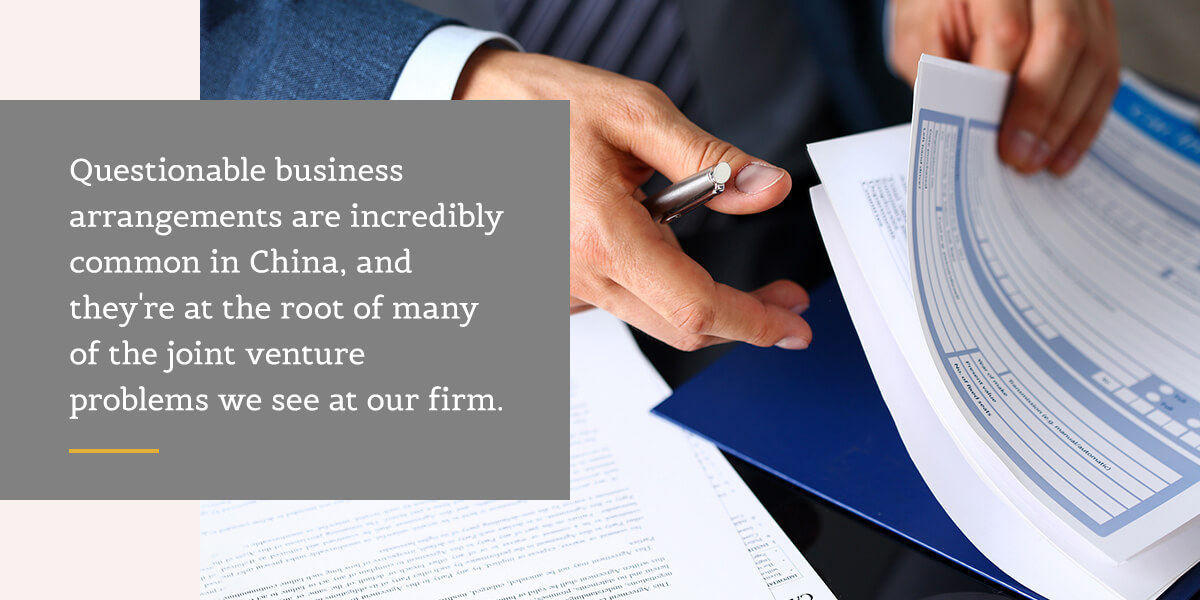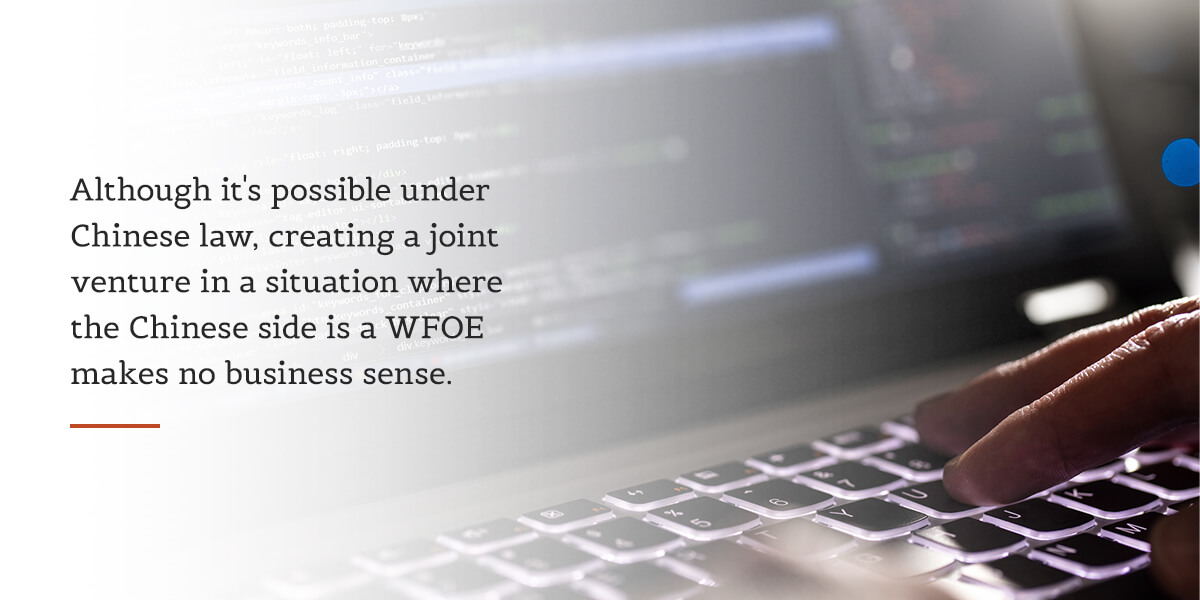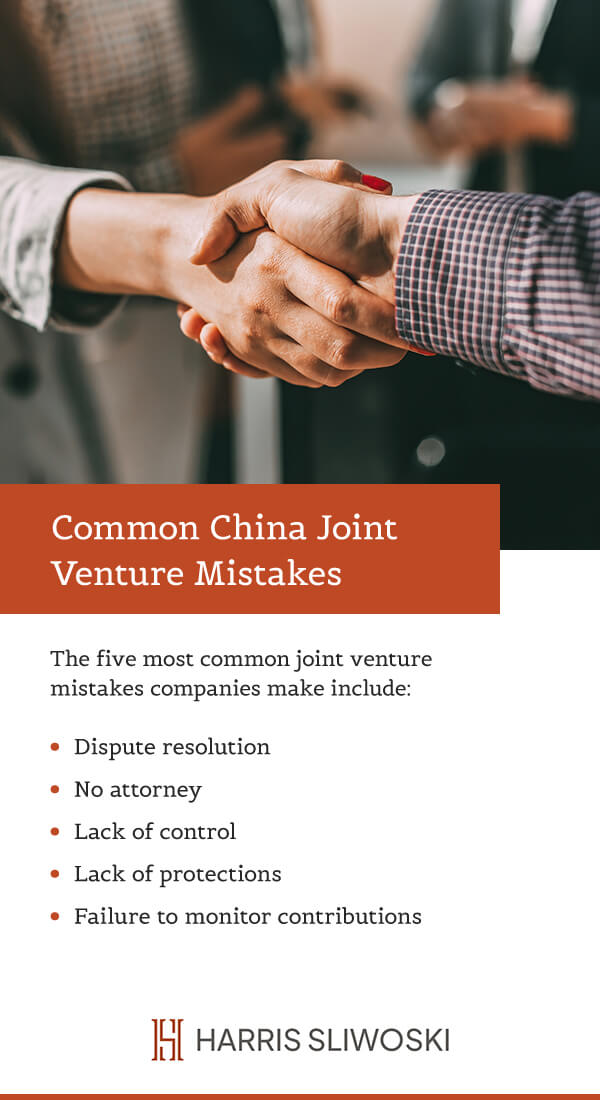Despite (or in many cases because of) the increasing difficulties foreign companies face in doing business in China, there remains nearly as much interest in China joint ventures as ever. Our China lawyers have also seen a recent uptick in companies needing help with failed and failing joint ventures, which is to be expected as COVID in China is moving into a considerably riskier phase and as China’s economy continues to decline. This post is intended to provide you with pretty much all the information you should know to navigate China’s joint venture minefields.
What Is a China Joint Venture?
A China joint venture is a business agreement where a foreign investor and at least one Chinese company combine for a specific purpose. That purpose can be anything from completing a new project to breaking into the Chinese market.
There are two types of China joint ventures:
- Equity joint venture (EJV): An EJV distributes both profits and losses in proportion to each party’s equity interests. The joint venture must be a limited liability company (LLC). Additionally, the foreign side must invest at least 25% equity interest in the EJV’s registered capital. The Chinese side has no minimum investment.
- Cooperative joint venture (CJV): In a CJV, both parties can operate as distinct legal entities rather than as one single entity. Companies can also register a CJV as an LLC if desired. The contract provisions determine the distribution of profits and losses between parties.
A typical joint venture has a fixed duration of 30 to 50 years. Sometimes, though, the Chinese government grants joint ventures an unlimited operating period. This extended window is common in situations involving the transfer of advanced technology.
How a Joint Venture Works
China bars foreign companies from participating on their own in many industries, but in some of those industries foreign companies can participate only by forming a joint venture with a Chinese partner.
A joint venture can be beneficial for foreign companies, as it provides access to:
- The Chinese joint venture partner’s existing workforce and resources
- Industrial sectors closed to Wholly Foreign Owned Entities (WFOEs)
- The Chinese joint venture partner’s existing sales and distribution channels, or other connections
- A lower upfront investment than a WFOE, so long as the Chinese joint venture partner shares in the funding and operational costs of the joint venture
That said, you must determine whether a China joint venture makes sense for your company before signing on the dotted line. Partnering with a Chinese business can be tricky for various reasons, so understanding to what you are agreeing is absolutely critical. This is especially true because the Chinese law, the Chinese government, and the Chinese courts will be heavily biased in favor of your joint venture partner in any dispute between your company and your China joint venture partner’s company.
Important Questions to Ask Before Forming a China Joint Venture
Before anything else, you need to ask yourself (and answer) a number of critical questions. Why is your company looking to form a China joint venture? What specific goals do you think this move will achieve? Further, is your putative China joint venture company the right Chinese company with which your company should be forming a joint venture? An old Chinese saying often applied to joint ventures is “same bed, different dreams.” If you and your potential China joint venture partner have different intentions in mind, you are unlikely to experience much success. The sooner you know whether you and your putative Chinese partner share the same dreams, the sooner you’ll know whether you should keep putting time and money into this deal.
Once you know your goals and expectations regarding the joint venture, you should discuss these openly with your Chinese partner to make sure you are both on the same page. If you are not on the same page, you should move on.
We’ve compiled a list of basic questions you can use as a starting point for determining whether to continue seeking out a China joint venture with a specific partner or not. The more specific you are in your questioning, the better. Getting on the same page with your potential joint venture partner will help you avoid common problems associated with a joint venture.
Are There Other Options to a China Joint Venture?
There are many alternatives to joint ventures and, generally, though not always, any of the following will be preferable to a joint venture:
- A WFOE
- A distribution agreement
- A reseller agreement
- A manufacturing contract
- A service agreement
For a more in-depth explanation of why these alternatives are likely to be better than a joint venture, I urge you to read this article I wrote for the Wall Street Journal about a decade ago. It’s still relevant today.
Roughly 50% of the time, the foreign company that comes to us all gung-ho about entering into a China joint venture does not realize that it has other options. This is in part because Chinese companies will often insist that a joint venture is the only “legal” option. They do this because they know how powerful joint ventures can be for them and how defenseless a joint venture will leave you.
The other roughly 50% of the time, the foreign company understands that it has alternatives, but they believe that a joint venture makes sense for them because of the contributions they believe their joint venture partner will be able to make to the venture. Even in these situations there are many times where a contract will allow the foreign company to benefit from the very same potential contributions from the very same Chinese company. However, there are times when the putative Chinese joint venture partner has made it clear that it will only provide these benefits via a joint venture. These are the difficult situations, and this is when you need to weigh the benefits of the joint venture versus the costs.
What Makes for a Successful China Joint Venture?
Based on both our own observations and on what we hear and read about others, we believe the following four elements are key to a successful China joint venture. Having all of these four things in your China joint venture will not guarantee its success, but not having all four of these things in your China joint venture will almost certainly guarantee its failure.
1. Clear Ownership and Control
Make ownership and control of your China joint venture explicit from the outset. Most Chinese managers see joint ventures as their property and disregard control issues arising from percentage ownership interests.
Obtaining recognition and agreement on control structures from the Chinese side is critical and (in most instances) you should insist on a structure that allows you to exercise control over the joint venture, particularly regarding certain aspects of its day-to-day operations.
You can never assume that your Chinese partner understands the implications of an agreement based entirely on legal technicalities. If the Chinese side feels tricked into giving up its rights, it will likely take corrective action.
2. Majority Ownership Interest
Does a joint venture have to be 50/50? No, and when it comes to China, it shouldn’t be. In fact, a 51% ownership interest is not enough to provide effective control. 51/49 ownership arrangements are usually a big mistake in China because the Chinese side typically does not see a difference between 50/50 and 51/49 joint venture arrangements. They also tend to view legal control afforded by 51% ownership as unfair. Joint ventures where one side clearly intends to exercise control typically use a 60/40 or 70/30 ownership structure.
Foreign investors using a 51/49 JV structure should not think that having control of the joint venture’s board of directors gives them control over the joint venture. In reality, the board has minimal control over company operations. Power actually lies with two people:
- The managing or representative director
- The company’s general manager
These individuals are able to dictate the company’s operations and can act — and usually do — with little or no supervision from the board of directors. Therefore, if you intend for your company to exercise actual control over your joint venture, you must structure the JV so your company has the power to control and appoint both the managing director and the general manager. And you should also be sure that the people in these positions respond to you, rather than to your Chinese partner. Without your company having direct control over these positions, your control over the board of directors is of little to no benefit.
3. Strong Legal Foundation
Do not proceed with a joint venture formed on a weak or uncertain legal basis. Questionable business arrangements are incredibly common in China, and they are at the root of many of the joint venture problems our China lawyers so often see.
More than half the time when a foreign company comes to one of my firm’s China lawyers for help in reforming or getting out of their China joint venture, their joint venture agreement contains one or more illegal or totally ineffective provisions that makes reforms or even an exit either incredibly difficult or harmful for the foreign company. Going forward with a shaky JV agreement usually means you will be unable to defend your company’s rights because the Chinese courts will not have any good legal grounds to help you.
That’s why the Chinese side often convinces its foreign partner to go through with potentially illegal ventures. There is little to no risk involved for them. If the joint venture fails, the Chinese side has the advantage of having received funds from the foreign venture. And if the joint venture succeeds, the Chinese side has the advantage of being able to take over the venture because it was never legal to begin with. It should go without saying that if your trusted attorney is telling you your joint venture is illegal, and your prospective partner is telling you to go ahead anyway, listen to your attorney.
4. Active Participation
It is crucial that you actively participate in or supervise your joint venture’s day-to-day management to prevent problems from arising. Usually, this means that your company appoints and directly controls at least one senior manager who controls your JV’s day-to-day operations.
If you are not involved with your joint venture, your Chinese partner is likely to believe that they are doing all the work without receiving proper compensation. This kind of situation breeds resentment, and the Chinese party may wish to take corrective action to restore fairness to the agreement. Additionally, if left unsupervised, the Chinese side can manipulate the JV for its own benefit.
Common Problems with Joint Ventures
Our law firm usually gets a China joint venture matter when a company asks us for help in the arrangement. Our immediate answer is to say yes we can, because we can.
That said, half the time, a China joint venture is just a bad idea for our client. These agreements have a notoriously high failure rate for many reasons, including but not limited to the following.
Intellectual Property Theft
We often see joint venture agreements drafted to facilitate intellectual property (IP) theft. With China’s declining economy and rising international tensions, our China lawyers are seeing an increase in various foreign company problems. One of the most common examples of joint venture failures has to do with joint venture IP issues.
All too often, Chinese companies will propose a joint venture for the sole purpose of stealing the foreign company’s IP. China has been using this ruse for more than 30 years and it always becomes more common during economic downturns.
The classic technique for using a Chinese joint venture to steal foreign IP — including trade secrets — usually goes as follows:
- The foreign company offers to sell complex, expensive technology on a standard technology licensing basis.
- The Chinese side insists the price is too high for untested technology.
- The Chinese side proposes a joint venture agreement with the foreign company where the foreign side will own some percentage of the to-be-formed entity.
- The foreign side contributes one unit in exchange for its ownership interest, while the Chinese side contributes the rest. This means that the JV now owns the technology for China.
- The JV agrees to purchase a number of units at full price after the first unit is up and running properly.
- The foreign company delivers on their agreement and trains the Chinese side on how to operate the technology.
- The JV reneges on the agreement, claiming the foreign company’s technology doesn’t work properly.
- The foreign company eventually discovers that its Chinese partner has cloned its tech and sold it to unrelated — and usually state-owned — companies in China.
- Because the JV owns the technology, this unauthorized use infringes on its IP. However, because the Chinese side controls the JV, it refuses to defend its rights by suing.
- The JV disappears. Normally, the Chinese side buys out the foreign side at a substantial discount.
You can protect yourself from the above sort of IP theft by being smart about entering into a well-crafted China-centric JV agreement.
Joint Venture Scams
If you’re looking to do a joint venture with a Chinese WFOE — a Chinese company wholly owned by a foreign company — consider this your warning. This arrangement almost never makes sense and usually indicates that the deal either needs restructuring or is a flat-out joint venture scam.
One sign of a scam is that the WFOE is owned by a Hong Kong company. Many people do not realize that Hong Kong-based companies are not legally PRC companies, so they create a JV thinking it will help them break into China. In reality, China and Hong Kong are separate countries when it comes to business.
Although it’s possible under Chinese law, creating a joint venture in a situation where the Chinese side is a WFOE almost never makes business sense. There are two reasons why:
- To enter restricted Chinese markets, you need to form a JV with a Chinese company. A JV in China with a non-Chinese entity will not have the same effect.
- If the Chinese entity is a WFOE, a joint venture is not necessary. Instead, you can purchase an ownership in the WFOE’s parent company directly.
Common China Joint Venture Mistakes
If you have a poorly drafted JV agreement, it is probably going to fail, and there’s little chance that even the most experienced attorneys can help you at that point.
In our experience, bad joint venture agreements are usually the result of ignorance of Chinese law. Many times, the foreign company has misinformed views such as “China has no laws,” or “the JV contract is not worth the paper it’s written on.”
Because of these misconceptions, the foreign JV participant fails to secure good legal representation going into the deal, leaving our law firm with little or nothing to work with in terms of fixing the joint venture problems.
Though China’s courts will often enforce foreign arbitral awards, the issues between joint venture partners more often hinge on issues relating to control and operations, which typically require an initial Chinese court decision.
The following are the five most common joint venture mistakes our China lawyers see foreign companies make :
- Dispute resolution: In their contracts, many companies provide for joint venture agreement disputes to be resolved outside of China. But most of the time, this provision does little to protect the foreign partner. Litigation and arbitration need to take place in China because that’s where the problem usually exists and because Chinese courts are not likely to cede these decisions to a foreign court or arbitral body in any event.
- No attorney: DO NOT rely on your Chinese partner to handle the legal work for you. This is a guaranteed disaster. Your Chinese joint venture partner has ZERO incentive to protect your company’s interests and without qualified legal expertise on your side, your Chinese partner could easily cheat you out of millions of dollars.
- Lack of control: Foreign companies often rely on a majority share interest to control their joint venture. Do not do this. Instead, exercise effective control through the right to appoint the joint venture’s representative director and the general manager.
- Lack of protections: Do not assume joint venture share ownership is enough to provide adequate protection. Just because you own 51% of the joint venture does not mean you will be protected. This is why hiring an attorney or legal counselor is so important. You need to know that your contract protects your company’s interests before committing to any sort of deal.
- Failure to monitor contributions: Failing to carefully monitor capital contributions and the use of those contributions, assuming that accounting reports will be adequate to reveal the fate of money contributed, is a big mistake. It is almost impossible for foreign companies to accurately track how their Chinese partners use contributions.
Although the above may look like a long list, we often see joint ventures where the foreign participant has made every single one of these mistakes — and more not even mentioned here. When a foreign company that has committed the above JV mistakes comes to us with a joint venture problem, our attorneys are severely constrained in terms of what we can do to help.
Again, these problems do not arise because China has no laws, or because China contracts are worthless. These problems typically arise because the foreign company failed to properly form and/or manage its China JV, which makes fighting back against the JV sleights untenable.
Examples of Failed Joint Ventures
The below are a few typical examples of China joint ventures that failed.
We often get calls from companies complaining that their representative director has hijacked the JV’s operations and now acting without supervision and against the wishes of the board of directors. To address this issue, it is usually necessary to proceed in a Chinese court directly against the rogue director. When these companies signed joint venture agreements that call for disputes to be resolved an arbitral body outside China, we are effectively precluded from taking such direct action. This is one situation that is highly likely to end up in failure.
Here’s another joint venture failure example that’s more common than you might expect. We have seen U.S. companies that have put tens of millions of dollars into a Chinese joint venture following the legal counsel of either:
- Their joint venture partner
- A local Chinese lawyer with little or no experience in foreign joint ventures
These parties have no real incentive to protect their foreign clients, and they’re likely to charge low prices for poor work. We once had a client who came to us boasting of the great job his Chinese lawyer had done for only $600. His pride quickly faded when we pointed out how his joint venture had a loophole that would allow his joint venture partner to pocket every penny. You should always use your own attorney to help you with your joint venture agreement.
The China Joint Venture Squeeze Out
Chinese companies interested in a joint venture often claim they want to share “the upside” with you when the joint venture goes public.
Reality check — that’s probably not going to happen. Instead, your Chinese business partner is likely going to try to force you out of the joint venture once they decide they’re done with you. We call this the “China Going Public Freeze-Out.”
Our China lawyers tell every foreign partner in a Chinese JV not to transfer their ownership interest in the joint venture unless and until the money you are owed for those shares is in your home country bank account in your country’s currency. When we give this advice to our clients, they almost always reply that the Chinese side has told them that advance payment for the transfer of ownership is impossible.
The problem is that the process of transferring money from China is more complex than many companies expect. Here’s what I mean. First, the Chinese side must convert their RMB to the foreign partner’s currency and then transmit that money through a PRC foreign exchange bank. The Chinese bank will then work with the local tax and company registration authorities and report that the conversion and transfer is impossible until after all of the following are complete:
- Conversion of the entity from a China JV to a wholly Chinese-owned entity. This process requires approval from local authorities, an independent appraisal of the entity’s values and an audit of all the company books.
- Transfer of the ownership interest to Chinese persons.
- Payment of all back taxes and fees of the JV entity.
- Payment of a substantial tax on the gain realized by the foreign partner.
- Payment of an additional withholding tax on the overseas payment.
As you can probably tell, this is a time-consuming procedure. To avoid the long process, the Chinese side will often claim to be unable to transmit its payments out of China. It will then push for the foreign party to open a Chinese bank account where it can deposit the payment funds in RMB. It then becomes the foreign partner’s responsibility to convert the RMB to dollars and then transmit the funds from China to its home country.
The outcomes of this procedure are also uncertain. The amount of taxes and other fees you’ll be liable for depends entirely on the unconstrained decision of the local Chinese authorities. And there’s no certainty that the conversion and payment of funds to the foreign company will be approved under commercially reasonable conditions. It almost never is.
Essentially, what you are facing is not a good faith buyout. What you are facing is a joint venture squeeze out. In this scenario, the Chinese side is forcing you — the foreign party — out of the JV without providing fair compensation.
Is There a Solution?
When a client tells us the above, our response is to state that what the Chinese side has told you is that it will not buy your JV interest on reasonable terms. This means it is impossible, and so you should do nothing.
Clients will then often come back and ask for examples of where the Chinese side conducted the JV buyout on normal commercial terms, where the transfer comes after payment is received. We don’t have any such examples because that’s not how the Chinese JV system was designed to work.
The Chinese joint venture system was set up to make commercially reasonable buyouts impossible. The goal of the Chinese government was and is to force foreign companies to keep their investments in China, and the government established its JV rules and regulations to accomplish this purpose.
These situations usually play out in one of two ways:
- The foreign party finally gives up and abandons its ownership interest in the JV entity without receiving payment.
- The Chinese side makes a nominal payment to the foreign side using funds from outside China. This payment is usually equal to the foreign side’s investment contribution, without interest. The foreign party then abandons its ownership interest.
After the foreign party is gone, the Chinese owners skip the complicated conversion process and liquidate the entity. Normally, the entity owned by the majority Chinese side investor absorbs the JV. In rare cases, a new entity forms and takes over the JV’s physical and IP assets, most of which came from the recently removed foreign partner.
We have never seen an alternative to this scenario. The best strategy for you is to sit tight and refuse to act until after the payment has arrived in your bank account in your currency. Although that payment is rarely substantial, some payment is better than nothing.
The right position to take is that it is the Chinese side’s responsibility to figure out how to get a payment to you. Your Chinese business partner should pay you a fair price in your currency to a bank account in your home country if it genuinely wants to buy you out of your JV ownership interest. If it can’t do that, it was never really planning a buyout.
Essentially, when faced with a squeeze out, all you can really do is insist on maintaining your ownership share in the joint venture entity. There is no other alternative.
How Can You Protect Your Company in a Squeeze Out?
To protect your interests and achieve your goals, structure a simple program that includes the following procedures:
- Arrange for a trustworthy Chinese company to buy your stock at its current value in U.S. dollars. The company should wire those funds to you in the United States after deducting any applicable taxes.
- After receiving confirmation of a successful wire transfer into your U.S. bank account, you will resign as a director at the joint venture company. You can complete and deposit this paperwork in advance with legal counsel.
This standard structure is the best way to ensure you will actually receive payment for your shares when your joint venture breaks up. A delayed payment structure or a nominee relationship would expose you to near infinite risk, which isn’t appropriate for you to deal with when your business partner is squeezing you out.
To achieve your additional goal of sharing in future stock appreciation, require the stock purchaser to make annual payments to you of an amount equal to the previous year’s increase in stock value.
If nothing else, remember this: do not give up your position in your joint until after you receive a cash payment into your own country’s bank account via wire. Remember these key points:
- If the issue is the sale price, you can set the price equal to an estimate of the growth value of the shares over some period, say five to ten years. That premium over current price would then be your compensation for agreeing to the buyout.
- You could also accept a riskier arrangement where you get annual payments reflecting the increase in stock value over the prior year.
- Do not agree to a nominee arrangement that does not involve a substantial payout to you now. Instead, use a formal shareholding trust agreement, which is possible under Chinese law.
A quick note on nominee arrangements. There is unavoidable risk involved with nominee shareholding. Over the past 15 years, for example, Asian joint venture investors from Taiwan, Korea and Hong Kong who have used nominee shareholding agreements have had generally negative experiences.
Contracts intended to get around Chinese law or that mislead the public are void, and that is what the courts usually decide when such contracts are challenged. You don’t want a lawsuit — you simply want to receive fair payment for your stock.
Licensing vs. Joint Venture
The difference between joint ventures and licensing is simple. A licensing agreement is easier and offers potentially greater reward with a lower required investment. Essentially, the company that developed the IP maintains ownership and licenses its use to other companies. In a joint venture, however, both companies own the IP.
On that note, we’ve seen a peculiar issue pop up with many American tech companies. These companies usually share the following characteristics:
- They’ve developed a technology that’s good, but not great. Think chips, hardware, software, or Internet of Things devices.
- Although they received heavy initial funding, they only have around six months of cash left at their present burn rate.
- They are receiving attractive offers from massive Chinese companies that want the technology. However, these companies often don’t want to pay anything upfront for it.
Chinese companies usually offer one of the following options, both of which are horrible for the American company.
Technology Licensing Deal
In a typical licensing deal, the Chinese company offers to pay the American company X percent or X dollars for every widget sold using the American company’s technology. This is usually a terrible deal for two reasons:
- Aggressive timeline: The Chinese company is unlikely to incorporate the new tech into its product, sell the product and pay up in time to save the American company.
- Lack of visibility: More importantly, it is usually difficult or impossible for an American company to accurately — or even close to accurately — track the sales of a Chinese company.
Licensing agreements can be tricky to navigate. Although this method may seem like a cheap way to get your product into China, we’ve seen too many licensing and joint venture agreements that heavily favor the Chinese side to say it’s a good move.
See How to License Your IP to China for more advice.
Joint Venture Arrangement
A Chinese company will often offer to form a joint venture arrangement where the American tech company gets X percent in the venture.
- It’s unlikely that the joint venture can be formed in fewer than four to six months. Actually, it’s likely to take longer than that if the American tech company wants its technology transfer to the joint venture to count as a contribution for equity purposes.
- It’s typically very difficult for foreign companies to accurately monitor the sales of their Chinese joint venture entities.
We’ve had so many Western companies call us for help because, although their Chinese joint venture entity seems to be thriving, they have never seen a penny.
What should these companies do instead?
Simple. Hold firm with the Chinese companies and require they pay a large upfront sum for licensing your technology. Nearly every time we have counseled our clients to do this, the Chinese company has backed down and paid.
The Bottom Line on China Joint Ventures
If you’re looking for a way to enter the Chinese market, you might want to consider something other than a joint venture.
What have you experienced in forming or breaking up China joint ventures? Tell us about it below.









































